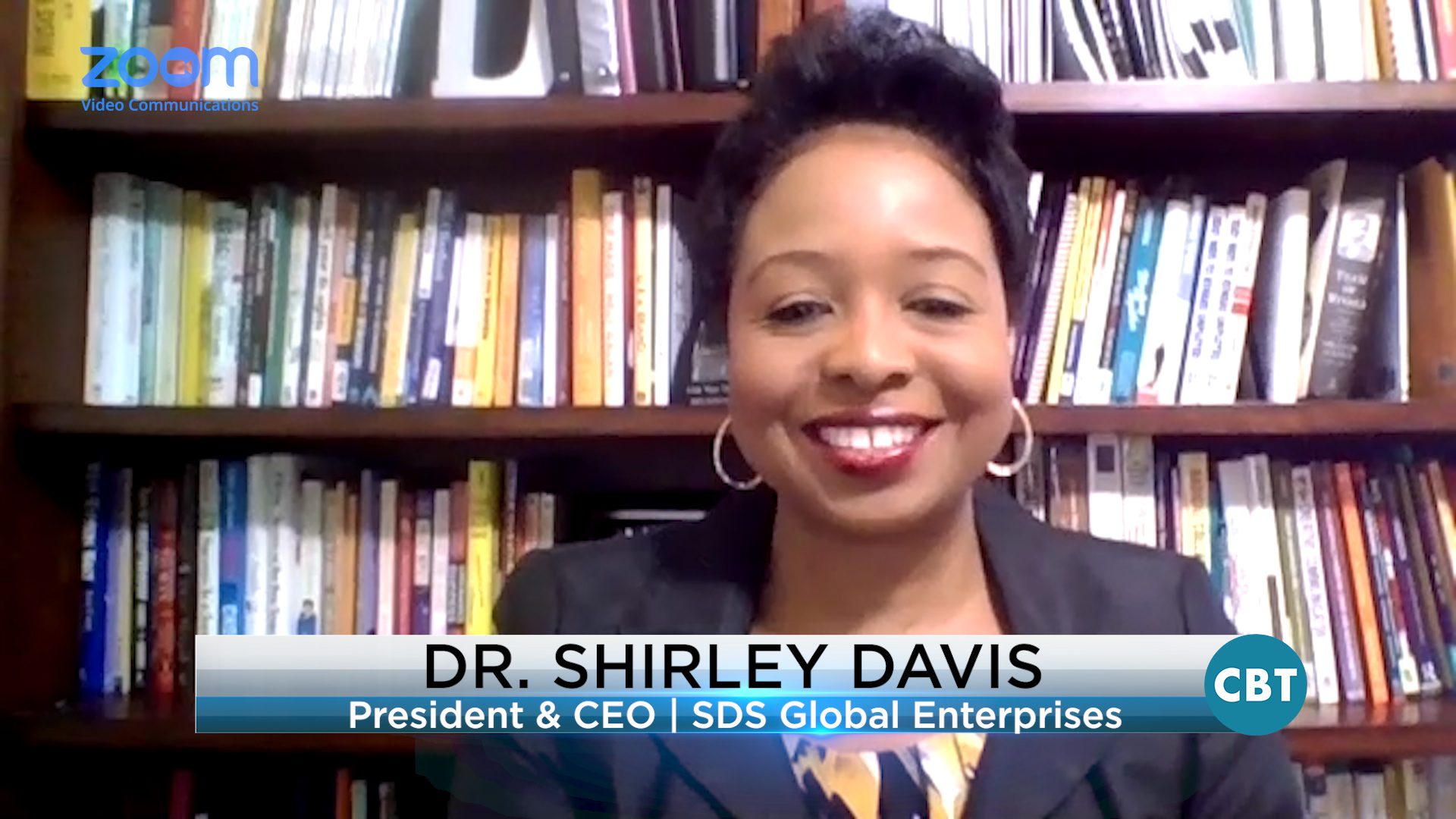To combat unconscious gender and racial biases in the workplace, management must take deliberate action against them, or it could cause tremendous profit losses. On today’s show, we’re pleased to welcome Dr. Shirley Davis, President, and CEO of SDS Global Enterprises, certified leadership coach, and Diversity and Inclusion global thought leader.
Jim F: We’re so happy to have with us, Dr. Shirley Davis, president and CEO of SDS Global Enterprises, diversity and inclusion global thought leader, and certified leadership coach. Thanks so much for joining us on today’s show, Doctor.
Shirley Davis: Good morning, It’s a pleasure to be here, hello.
Jim F: Great. So let’s kind of jump right in here. For our viewers who may not be familiar with the term unconscious bias, tell us what that is.
Shirley Davis: Unconscious bias, first of all, is something we all have. It is a human trait, it is a part of our brain. But it’s an unconscious opinion, could be positive or negative, and it’s something that we might have about a group or a person, or even a thing. And it’s the attitudes or the stereotypes that are taught at a very, very young age and they strengthen over time. And they affect the way that we interact, the way that we make decisions and our understanding of other people.
Jim F: What effect does unconscious bias have on our daily interactions with others?
Shirley Davis: So on our decision making, right? So it can affect the way that we interact, and how we engage with people or choose not to. Who we buy from, who we don’t, who we hire, who we don’t. Who we like, who we might invite out after work. It depends on what we’ve been taught early on, and how we prejudge, and how those stereotypes are internalized to how we treat other people. So it informs our decision making every day in a very quick snap. We call it a snap judgmental way.
Jim F: And what does the research tell us about how the human brain makes decisions that impact not only diversity, but other human judgments as well?
Shirley Davis: The research tells us, and Harvard has done quite a bit of this, Harvard University and their school of business studies does quite a bit, and some really great research comes out. But they tell us that one, not only do we all have it, it’s a part of our human makeup in the way that our brains function. Because we are hardwired to prefer people who are like us, who sound like us and who share a lot of our same interests.
Shirley Davis: And when left unchecked, biases really have a negative impact on every interaction. And so think about, for example, if you’re having to hire someone, you tend to like to hire people who look like you, who think like you, came from your same community, or went to your same school, or to your same university. Those are ways that it starts to impact.
Shirley Davis: But what the research tells us as well is that, unconsciously, we’re making these decisions and that’s what shows up every day, the way that we decide who gets hired, who gets fired, who gets paid more, who gets promoted, who gets better ratings, and how do we assess their performance. And even some of the languaging that we use. So it can show up even in ways that we discriminate, or ways that we prefer others.
Jim F: Knowing about it is one thing, being able to act on that knowledge. What do you recommend? How do we deal with this?
Shirley Davis: So one is recognizing that, it’s called unconscious bias, right? So the important thing is to move from being unconscious about it to being much more aware. So yes, it helps to go through some type of learning experience, it helps to have people who are around you who are not like you, who can help you raise your level of consciousness and to broaden your perspective around the world of people around you who are different from you. So it’s very important that we do that. And that’s a lot of what research tells us, is that when we are not exposed to people who are different from us, we tend to continue to have a very narrow focus and then a much more judgemental way of single the world.
Jim F: So we just need to be exposed to more, many more different types. Right?
Shirley Davis: Yeah. And training helps, right? It’s important to go through training. A lot of unconscious bias training is happening, and once you become aware of your biases, you’re no longer unconscious. Now you have to move from being unconsciously incompetent around how you make decisions, to being more consciously intentional about including other people who are different from you. Especially in this current age, where there’s so much diversity, and everyone needs to understand how to lead and work across differences.
Jim F: And let’s switch gears a little bit, and talk about how it affects businesses because of your unconscious bias towards customers, right? What about that? What about potential customers? What are the consequences of approaching customers through a skewed lens?
Shirley Davis: Well, there could be a lot of consequences. One is that, if you don’t reflect or if you aren’t aware and can’t relate to people who are different from you, that certainly can affect not only talent that you’re trying to bring into your organizations, but certainly customers, your donors, your members, or other clients. So you want to be able to relate to people of all different backgrounds, all different cultures, all different belief systems. And the way that they look, the way that they dress will all be different.
Shirley Davis: Think about a millennial from a baby boomer. Think about a woman from a male, their experiences are different, their lenses are different, and we have to be able to relate to a wide range of customers. If we don’t, then our customers are going to go take their business and their dollars to companies that do relate to them, understand them, and treat them with respect.
Jim F: You could open up so much more of your business if, in the event that you’re just aware of this and you make the necessary changes, right?
Shirley Davis: Absolutely.
Jim F: I mean, I’m sure people are watching this today saying, wow, I probably fall into that category of not giving it my all with certain customers, just based on my bias for those individuals.
Shirley Davis: Absolutely. Think about the companies, even today, who have had customers who have not been treated with respect, or not even been included, or not even considered someone who’s worthy of their business, and they take their business elsewhere. That’s a going out of business strategy, not to be able to relate to and have the kind of workers who understand different needs. Whether it’s Latina, Hispanic, Asian American, African American, white, black, green, yellow. Your customers are going to look different, but their money is all the same color.
Jim F: That’s right.
Shirley Davis: And as you want to have a competitive business, and you to remain relevant, you’re going to have to be able to relate to a diverse clientele.
Jim F: And you’ve got a responsibility to your associates and your employees and your colleagues, to kind of show the way here, right? So that they don’t fall in to that same situation, where they each have their own bias towards certain groups.
Shirley Davis: Absolutely. That’s why it’s important to have these conversations. That’s why it’s important to have the learning experiences, so that we can talk about what those differences are. When we don’t understand things, we judge them. And we might judge wrongly, and certainly we may miss out on opportunities to better serve more clients and to build our brand in a more, a broader way.
Jim F: Yeah, that’s for sure. So, so what are some strategies for addressing bias in the workplace?
Shirley Davis: Yeah, so I’ve hit on a couple of them. One is that you want to first start with it, acknowledging that we all have it.
Shirley Davis: Secondly is recognizing that we need to learn what are our biases. I recommend that people take the implicit association test. It’s free, it’s offered by Harvard university. You can Google it. Iat.org, I’m not getting any kickbacks from it at all. It’s a wonderful tool to identify, what are your biases so you’re aware of them, and it’ll show you how pervasive they are, and the impacts of those.
Shirley Davis: But also, I encourage people to broaden your circle of people, your people that you hang around with, the people that you hire, the people that you make decisions with. That’s important, and then certainly, I encourage you to not only be aware of your biases, but then be more intentional about having conversations with people who are different from you.
Jim F: Well, Dr. Shirley Davis, president and CEO of SDS Global Enterprises, and of course you’re diversity and inclusion global thought leader and a certified leadership coach. I want to thank you so much for joining us on today’s show. It’s been very enlightening, and we’re going to take you up on it and we’re going to get all of our viewers to take that screening that you suggested.
Shirley Davis: Implicit association test. That’s great, thank you so much for your time this morning.









